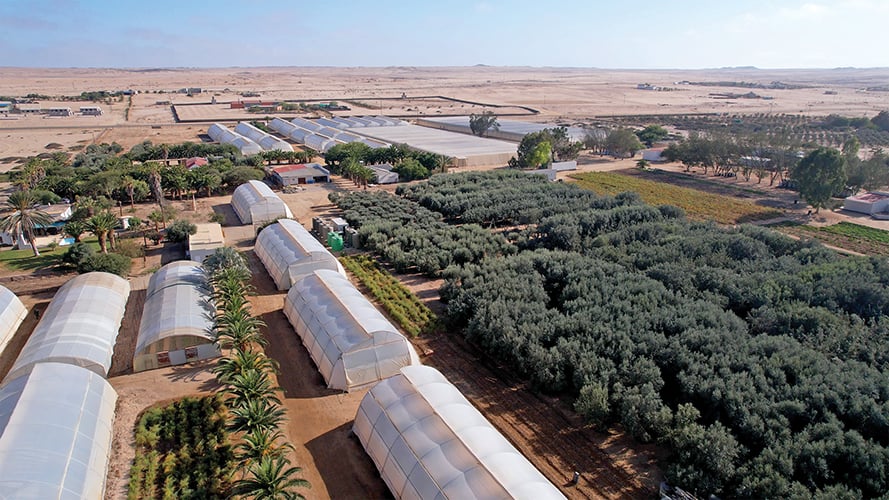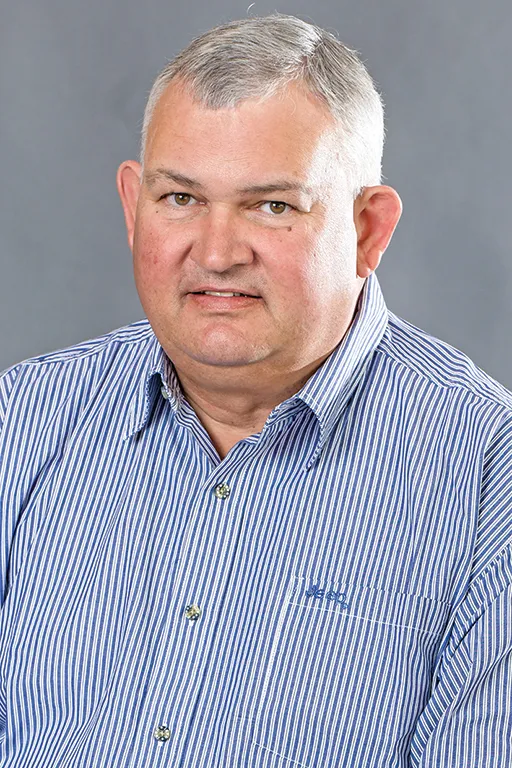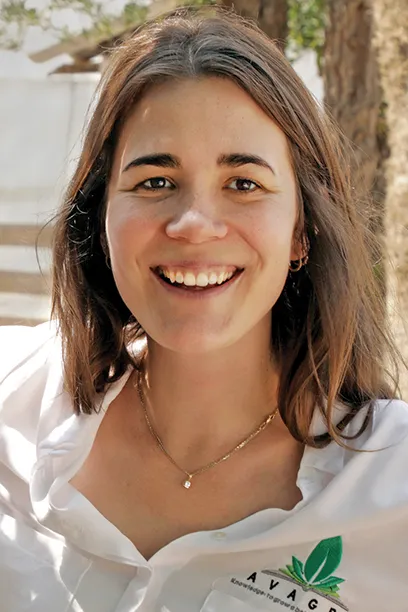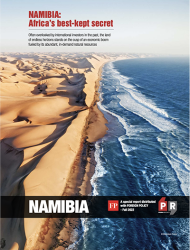Making the desert bloom
Leading Namibian private-sector pioneers in new and established business areas are driven by a desire to grow, sustain and add value to the country's economy

Hydroponic technologies could make Namibia a horticultural powerhouse.
The overriding mission of some of Namibia’s most pioneering businesses is socioeconomic development. A prime illustration is AvaGro, a precision-farming innovator that is boosting food security and value in agriculture — a sector that contributed around 6.7% to the country’s gross domestic product over the last two years and supports the livelihood of about 70% of the population. At present, Namibia is dependent on imported fruit and vegetables, as its harsh, arid lands present immense problems for farmers. AvaGro co-founder and CEO Leonie Hartmann describes: “We have three seasons a day, humidity can range from 90% to 20% and temperatures fluctuate drastically. The desert is also too dry, hot and salty for many crops.” To overcome challenges of food security, AvaGro established a farm in the Namib desert where they pioneered hydroponics cultivation in the country. Today, its flagship farm has 3 hectares of greenhouses in which tomatoes, peppers, cucumbers, flowers, herbs and other crops are flourishing in cocopeat grow medium. “We desalinate water using reverse osmosis and irrigate our crops through pressure-compensated driplines. That allows us to be very precise in our irrigation and nutrient application,” says Hartmann.
Just six years into the project, AvaGro has become Namibia’s first tomato exporter, she adds. “The top priority is our food security, but Namibia has the resources to produce a diverse product basket throughout the different seasons.” To bring that goal to fruition, AvaGro is building capacity by providing turnkey solutions to other producers and training to agri-preneurs and students. “We’ve also expanded into countries like Zimbabwe, Zambia and Eswatini so that we can carry the learnings from the harshest climatic conditions in Namibia into the region,” the CEO states. It isn’t only horticultural crops that are imported. “Namibian agricultural stock includes maize, wheat, potatoes, rice and mahangu, a type of millet,” explains Ian Collard, CEO of Namib Mills, the country’s preferred supplier of staple foods. “We’re not self-sustainable in carbohydrates, but farming is gaining efficiency and we should be self-sufficient in maize, for example, within 10 years.”

The company is Namibia’s largest grain miller, with 85% of the market and cutting-edge facilities for maize, wheat and mahangu. It has invested in branding and processing too, he reveals: “We have the largest pasta manufacturing capacity in the Southern African Development Community and make about 65,000 tons a year. We also operate an animal feed facility, an instant-porridge plant, a bakery, sugar and rice packing plants, and we produce about 32,000 tons of chicken annually.” Not all its goods are consumed domestically: it has a presence in Zambia, is among the three top importers of pasta into South Africa and its maize meal is enjoyed in Australia, for instance. Even so, the company’s first concern is nutritious food for Namibians, according to the CEO. “Our motto is ‘feeding the nation’ and we take that responsibility seriously. We ensure that there’s always basic food available and we’ve been doing that for 40 years.”
The firm intends to broaden its food manufacturing to further reduce reliance on imports. “Namib Mills will also evolve into a more integrated company. We’ll probably integrate backwards into farming and forwards into transport and distribution,” he says. Another business adding value to resources is Walvis Bay Salt Holdings, sub-Saharan Africa’s leading salt exporter that produces in excess of 1 million tons of solar-evaporated sea salt a year, 80% of which is shipped internationally, including to the U.S., in a wide variety of grades. “We’ve developed technologies to increase efficiencies, and now we’re looking for logistics and technology partners with innovative solutions for more value addition,” says managing director André Snyman. Ranked among Namibia’s largest businesses, the Pupkewitz Group has been a positive influence on the country for over a century. “We believe strongly in the role of the private sector in building and supporting the growth of the economy. Creating jobs, industrializing Namibia and uplifting citizens are core objectives for us,” states Pupkewitz Foundation CEO Meryl Barry. The group has six divisions, five of which are market-leading retailers: Pupkewitz MegaBuild in building materials and hardware, Pupkewitz MegaTech in electrical components and solar products, Pupkewitz Catering in catering equipment, Kaap Agri in agricultural products and Pupkewitz Motors, the largest automotive group in Namibia. The other, PayToday, is a popular mobile payments app and the result of an investment in a fintech startup. As Barry explains: “Supporting growth in new businesses is important to us.”

One of its biggest contributions to Namibia is an annual investment of around $500,000 into the country’s oldest foundation that is dedicated to eradicating poverty. The Pupkewitz Foundation has an annual impact on 1 million Namibians through programs that target community development, education, health, sports, civil society, arts and culture. “We’re guided by the national development goals, which are aligned with those of the United Nations. For example, we’ve implemented a volunteer system for our staff, who feed 3,000 children a week to alleviate malnutrition. We also contribute to infrastructural projects like classrooms, clinics and hospitals, and we’re proud of our pandemic response. Among numerous projects, we provided oxygen to hospitals and repurposed clinics,” says the CEO. Whilst adept in its established businesses, the group is building partnerships with international enterprises that bring knowledge and skills into Namibia to unlock new opportunities and to extend its portfolio into nascent sectors, Barry affirms: “Stepping outside our core capabilities is what’s required for our country’s development.”
Report Contents

 Download the PDF
Download the PDF